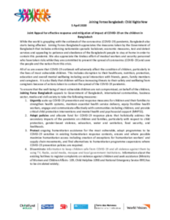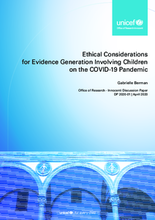This section highlights tools and resources for child protection in the COVID-19 pandemic.
Displaying 171 - 180 of 264
This brief from UNICEF outlines the urgent action needed to put migrant and displaced children at the forefront of UNICEF’s preparedness, prevention and response to COVID19 – to ensure health, safety, and protection for all.
This document presents an initial summary of potential GBV risk mitigation actions, based on established good practice, that are starting points to address GBV risks in this unprecedented situation.
To ensure that the well-being of the most vulnerable children are not compromised, Joining Forces Bangladesh appeals to the Government of Bangladesh, international communities, business sector, and media and civil society to take the measures outlined in this joint appeal.
In this blog post, Anna Riatti - coordinator of the UNICEF Refugee and Migrant Response in Italy - describes how UNICEF is supporting refugee and migrant children in Italy in light of the COVID-19 crisis.
This article outlines six key recommendations for swift global action and describes UNICEF's commitments to work with communities, governments and partners to slow the spread of COVID-19 and minimize the social and economic impacts on children and their families.
This note sets out how the children and young people your organisation supports are affected and what you can ask your government to do to ensure that they have the information they need to stay safe.
This note informs Save the Children's humanitarian response to the COVID-19 pandemic.
The COVID-19 Learning Pathway aims to enable humanitarians, including local responders, to be best equipped to respond to the global pandemic COVID-19 (Coronavirus).
The Alliance of Child Protection in Humanitarian Action with UNHCR hosted a webinar to explore the key considerations for adapting child protection responses in refugee settings to the current pandemic, including broader protection considerations.
This paper identifies key ethical considerations when undertaking evidence generation involving children during the mitigation stage of the pandemic (emergency phase), on subject matter relating to COVID-19 once the pandemic has been contained, and once containment policy measures, including lockdowns, have been lifted (post-emergency phase).




